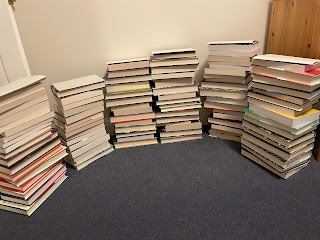Have you ever said yes to something without really knowing what you were agreeing to? I've just taken on a marathon, though it also resembles a sprint. I was honoured to be asked to be one of the 9 judges for this year's Historical Writer's Association Gold Crown award for the best historical fiction novel published between 1st April 2024 and 31st March 2025. Lots of lovely books to read, I thought. I've been reading historical fiction all my life. I've had two historical novels published world-wide by Penguin. I have opinions. How hard can it be?
 |
| The coveted HWA gold crown award. |
The first thing I notice is gender. Judging by the first names of the authors, more than 95 of the 131 appear to be women (and perhaps some of the tantalising initials are women too.) History girls are alive and flourishing! Are women writers particularly drawn to history, I wonder? The judges are also predominantly female, with 8 out of the 9 of us being women. (Are women more inclined to agree to take on these kind of roles?? Answers on a postcard.) We are Louise Hare (Chair), Ellen Alpsten, Mark Ellis, Louise Fein, Alison Joseph, Amy McElroy, Carolyn Kirby, Linda Porter and me. Louise says: 'I love seeing how broad the category of historical fiction is, encompassing so many different genres. This is my third time of judging the Crowns and I’m always fascinated by the trends that emerge within each cycle. I see our role as vital in rewarding literary merit within historical fiction, but really it’s about celebrating great reads, those books you want to tell all your friends about.' Under her guidance, we have until September to agree a longlist, October a shortlist, and November to choose a winner. Yikes!
 |
| Louise Hare, chair of judges, with HWA member Jim Burge at the award ceremony. |
Gender is also noticeable in the protagonists of the novels. Taking a straw poll of the 93 books I've been sent so far in hard copy, there is a massive predominance of books about women, particularly pioneering women whose names have been forgotten, but also enslaved women, witches and detectives. Perhaps this isn't surprising when a Guardian article from 2019 says that women readers account for 80% of sales in the UK, US and Canadian fiction markets – far more women than men are literary festivalgoers, library members, audio book readers, literary bloggers, and members of literary societies and evening classes... and form book clubs.
Elizabeth Fremantle, who won the 2024 Gold Crown Award with Disobedient, her extraordinary novel about Artemesia Gentileschi, says 'Disobedient, of all my novels, is closest to my heart, so it meant a great deal that it was the one to be recognised by the judges. I was truly humbled, and on the night utterly astonished, that my book was chosen from a short-list of such calibre.'
 |
| Disobedient by Elizabeth Fremantle |
In 2022 AJ West won the Debut Crown award with The Spirit Engineer. He says 'Winning was a complete shock and – un-English as it may be to admit it – a source of proud vindication after years of struggle to get published. Recognition from the HWA prevents me from being too pessimistic when things feel heavy and impossible. It reminds me that, though I'm not yet a wealthy author, nor necessarily an author with his book in high street windows, nor even an acclaimed author, I am something much more smug and satisfying: an author who benefits every day from the support of his fellow writers, whom I admire in greater measure.'
And so I dive in. Eight weeks till the longlist. How hard can it be?
Instagram: Maggie __Brookes





